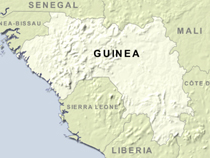2007年VOA标准英语-Violence Mars On-Going Guinea Strike(在线收听)
Dakar
15 January 2007
Tear gas, thrown rocks, and a handful of arrests heated up the scene in Guinea's capital, Conakry, as a nationwide strike against the government entered a second week. Naomi Schwarz reports for VOA from our West Africa Bureau in Dakar.

Dozens of people were arrested after Guinean youths took to the streets in support of striking workers. Several others were wounded by rubber bullets and tear gas when the military intervened to disperse the demonstration.
Maseco Conde, a local journalist, reported on the scene.
There were some rocks thrown, some violence, some tear gas, he said. It is really what he called "a hot day of this general, unlimited strike."
The strike, which began last Wednesday, has until now, been largely peaceful. But the Guinean government had earlier banned all public demonstrations.
During a similar strike last year, a student protest turned bloody when government forces intervened. Shots were fired and more than 20 people died.
The streets are now calm.
There is almost no traffic in Conakry, says journalist Maseco Conde. There are only military vehicles on the roads, and the banks, markets, and gas stations are all closed, he says.
A collective prayer session in front of the National Assembly was called off. The organizers, from the National Council of Civil Society Organizations, cited safety concerns as their reason for canceling.
Meanwhile, the National Council of Guinean Workers, the organization behind the nationwide strike, says it continues to work towards its goals. Union general secretary Radiatou Serah Diallo says the organization is working to comply with a request from President Lansana Conte that it put its demands in writing.
We are working on the letter right now, says Diallo. During a meeting Saturday, union leaders had asked that the ailing Mr. Conte step down. They say he is out of touch with current hardships.
The strike was also prompted by Mr. Conte's unilateral decision to release, from jail, two of his allies who are being investigated for corruption.
The striking workers have also met with the head of the National Assembly, Aboubacar Sompare, to urge him to invoke a parliamentary law that allows him to temporarily replace the president if he is incapacitated.
Mr. Conte seized power in a 1984 coup. The president, now in his seventies, is seriously ill and can barely walk. He is rarely seen in public, and speculation about problems surrounding his succession has been rife.